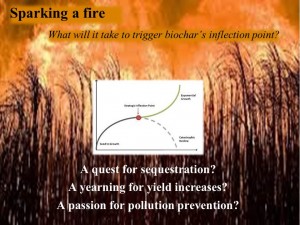In math the inflection point is the point on a curve where the sign of the curve changes. In business the strategic inflection point is when massive change occurs or as Andy Grove, Intel’s co-founder has said, it is “an event that changes the way we think and act”. It could be positive and lead to that dreamed of rocket ride to success or it could just as easily be negative leading to a company’s demise.
When I first learned about biochar, I was convinced that its ability to sequester carbon was going to be what caused people to sit up and take notice of biochar in droves. That hasn’t happened yet for a lot of different reasons. As I became entrenched in the biochar industry I became convinced that its ability to improve yield and soil fertility was really what was going to cause people to sit up and take notice of biochar in droves. That hasn’t happened yet either for a lot of different reasons. Both of those might still be inflection point triggers for biochar if regulatory changes occur in carbon markets or if food security continues to be challenged by climate change and low soil fertility.
But recently I’ve begun to see that there might actually be other triggers which had never occurred to me until I began doing some investigative reporting for a few upcoming articles for the Biochar Journal. Lately I have been talking to people that live in far flung places in Asia and Latin America where agricultural practices are very, very different from the norm in my neck of the woods. What I’ve started to see is that pollution may be a critical trigger, and not that gaseous pollution that is causing climate change either. I’m talking basic air and water pollution.
Burning crop residues is something rarely seen in Western New York but it is apparently very common elsewhere in the US as well as in many other parts of the world. Particulate emissions from burning causes horrendous air pollution which has a significant impact on human health – not to mention the complete waste of nutrients! To allow locals to breathe easier, regulations are beginning to be drafted and enforced to prevent the burning of crop residues which means farmers will need alternative ways to manage them. Charring these wastes in the right type of pyrolysis or gasification equipment will not only mean reduced pollution, but it can also mean renewable energy and of course biochar.
In other pollution news, dumping crop residues is the guilty party behind massive water pollution. Since clean water is becoming scarce and increasingly expensive, more attention is being focused on reducing point source pollution. Here again biochar could play an important role in averting pollution, generating renewable distributed energy and of course biochar.
Sometimes it only takes one spark to light a fire, but I am beginning to realize that that spark may be caused by different particles when it comes to biochar!


